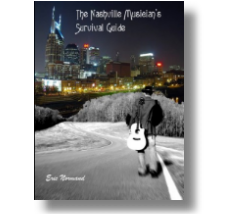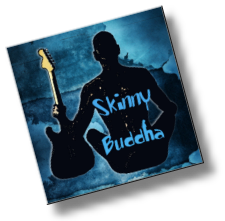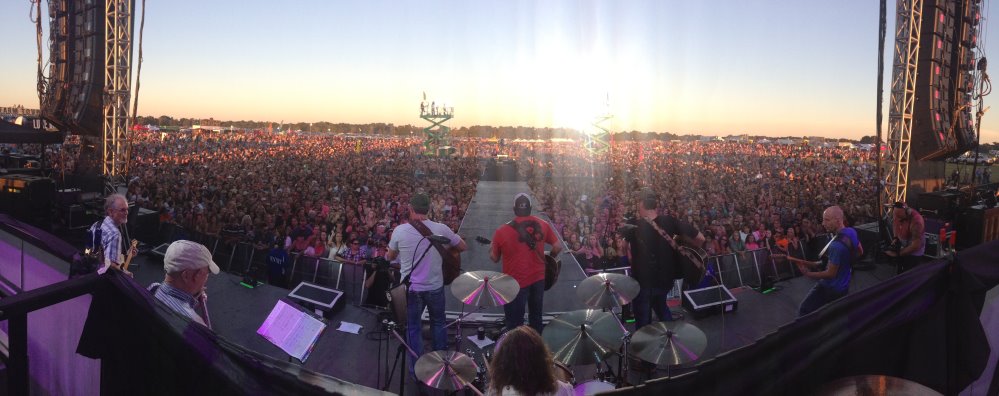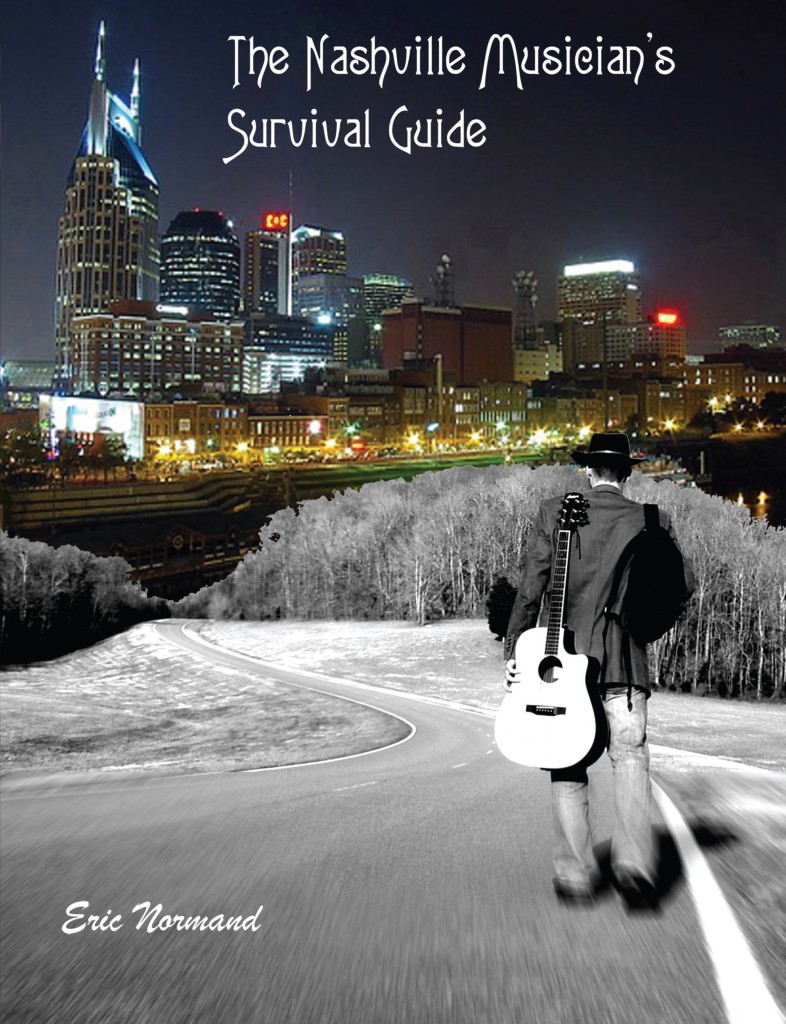
Back in 2009, I began putting together a list of people to interview for my book, The Nashville Musician’s Survival Guide, and my friend, Mike was at the top of this list. Those of you who knew Mike know that he was a very caring, giving, and humble human being. The interview he gave was not only insightful for aspiring musicians, but also a wonderful insight into his musical journey. Although he has now gone on to a better place, his music can still be heard, and his magical essence still shines through the words on these pages. It is with that spirit that I’d like to share his words with you all. Mike touched so many lives, and we are all the better for it. I miss my friend.
Use the buttons at the top or bottom of each page to move to the next page; the full interview is around 10 pages long.
During the last Nashville Berklee Jam to be held at The Rutledge, which sadly closed its doors shortly thereafter, international rock star, author, and motivational speaker, Zoro addressed a room full of hungry musicians with a heartfelt, life-changing talk. Well known as a professional drummer who’s played with the likes of Lenny Kravitz, Bobby Brown, and Frankie Valli, among countless others, Zoro, often referred to as “The Minister of Groove”, is also an educator who has given hundreds of clinics and authored the critically acclaimed “The Commandments of R&B Drumming”. He’s also known in the world of motivational speakers, having given hundreds of talks and authoring the book “The Big Gig – Big Picture Thinking for Success”.
But tonight’s talk was not about drumming, and while it delved into the world of professional musicians and artistry, at the core of this talk was a universal message that applies to all humans, that of finding your purpose in the world by discovering and maximizing your strengths. After his talk I was honored to participate in a performance with Zoro and A-list Session bassist, Mike Chapman. There’s a video of Zoro’s talk and some of this performance at the end of the article. Here are a few excerpts from his talk: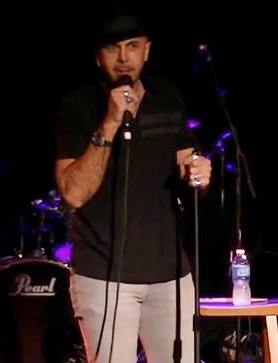
“The world has changed more in the previous 50 years that it has in the last 5000…. but there’s a few foundational things that I think will never change…Each person in this room is born is born with a certain gift and a certain talent. And for many of us, it’s musical talent. What will not change is excellence…no matter where the world goes or where music is headed, to me, if you have a musical gift, the most important thing is to exercise it, to develop it and to make it, point blank, excellent… I always feel that if you do something really, really well, eventually there’ll be a place for it somewhere. In a world where people don’t do things on a high level anymore, I still think that being excellent will make you stand out amongst the crowd…”
He spoke of diversity and the need to hone in on your strengths:
“I think each person here has more than one ability. I think your musical ability is one of them, but I think there are many. For me, I just pursued things that were naturally instinctive to me and interested me naturally. I wasn’t thinking business, I wasn’t thinking in 30 years I can be drumming, and be an educator, an author and speaker… I was thinking ‘I like writing… I’d like to write an article to help people. I like teaching’… so everything became a natural evolution of things I was already good at… so don’t worry about what you’re not good at, there’s going to be plenty, find out where your strengths are and then work on turning those into something that’s really monumental and excellent.”
I loved his take on marketing:
“The best marketing tool in the whole wide world is to just be bad-ass at what you do…because other people will tell people about you… people take notice of excellence, whatever it is. How many of you, when you go to a restaurant, take notice of someone who is an excellent server? We all notice when people do a good job…when I see a movie that’s great I tell everybody about it, but when I see one that sucks I also tell everybody don’t go waste your money.”
Often overlooked in the music industry as well as many others is the shortage of, and need for extreme professionalism:
“Some of the things it takes to succeed are very practical, but I find they seem to slip by the musical community. Things like; being on time, coming prepared, having your stuff together, being reliable… half of success is just showing up on time and just being ready. These things to me are totally obvious, but they seem to slip by a lot of the people that are creative.”
Perhaps one of the most important points he makes is that We Are in the Service Industry!
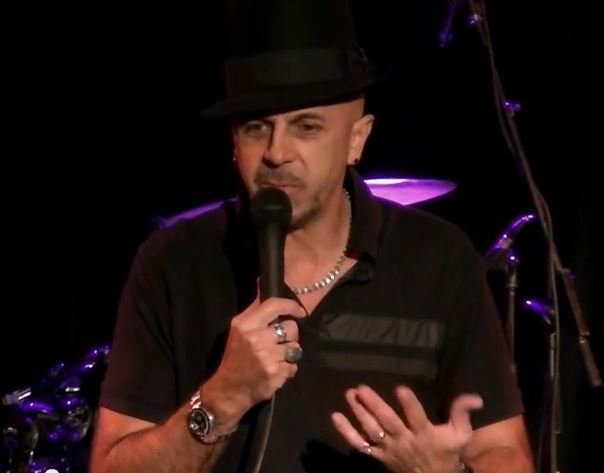 “Be accommodating. I look at everything that I do as really one thing, I’m a servant. I’m here to serve. Tonight I’m here to serve with my words, and I’m here to serve with my playing. I’m never here to be served, always here to serve… a lot of people have a perception of rock ‘n roll and fame… everyone’s catering to you and everyone’s worshiping you… there is an element of that that’s true, but I don’t perceive it that way. I perceive it as I have an opportunity and a platform, and an opportunity of privilege to serve people… I’m either serving the artist I’m playing with, or the crowd that I’m playing to.”
“Be accommodating. I look at everything that I do as really one thing, I’m a servant. I’m here to serve. Tonight I’m here to serve with my words, and I’m here to serve with my playing. I’m never here to be served, always here to serve… a lot of people have a perception of rock ‘n roll and fame… everyone’s catering to you and everyone’s worshiping you… there is an element of that that’s true, but I don’t perceive it that way. I perceive it as I have an opportunity and a platform, and an opportunity of privilege to serve people… I’m either serving the artist I’m playing with, or the crowd that I’m playing to.”
On creativity and vision:
“One of the greatest gifts human beings have… is the ability to dream… To dream up something that never existed and then to have the privilege of creating it is the greatest privilege in the world. And we all have that ability to dream and to believe that if we are willing to act on it and pursue it, we [can] turn that dream into a reality. It’s a great privilege and that’s what makes life really fascinating and interesting.”
He began a few words about the journey of self-discovery and life with a quote from Mark Twain:
“Most of us are anxious to be praised for the one gift that we don’t possess, rather than the 15 that we do.”
“If you don’t learn to enjoy the journey, the process, you’ll never enjoy life…the joy of life is in the process itself, and the journey of learning and growing and developing, that’s what life is…When people are not fulfilled it’s because they’re not moving toward something. You’re created to have purpose, to be moving forward in a direction towards the accomplishment of something.”
We’ve had many great guests speak at these events, all of them with unique angles, many catering to specific niches, and they’ve all been inspiring. This talk really got me thinking on many different levels and was one of my favorites to date. No matter what you do in life or what you do for a profession, many of life’s challenges and problems are universal. We can all work to discover our gifts, to hone them, to share them, to allow them to let us shine a little light in the world. Don’t let your dreams sit on the sidelines, find your gifts and make them excellent!
I would like to thank Zoro for sharing his words of wisdom and inspiration and for kicking out a great jam! I would like to thank Jeffrey Lien for helping me host this event and hooking us up with Zoro, the Rutledge and Andy Aquino for hosting our events for the past two years, Frank Sass for always providing great sound and lighting, and Jack Zander for capturing all the magic on video.
Zoro’s Talk (39 minutes)
https://www.youtube.com/watch?v=p0JPstlJAFQ&feature=youtu.be
Hear My Train A Comin’
https://www.youtube.com/watch?v=45iiMtKErwg&feature=youtu.be
Cissy Strut (with 5 minute drum solo)
https://www.youtube.com/watch?v=bXtXOzt5jNA&feature=youtu.be
By Eric Normand
At the August Nashville Berklee Jam we were fortunate to have an expert in the field of music for television and film – songwriter and CEO of Song Placement International, Kate Taylor. A native of Michigan, Kate has been in Nashville since 1999 and has had her songs placed in shows like “The Young and Restless”, “Teen Nick”, CMT, and countless others. Through her song placement company she has placed songs for hundreds of artists and is currently working with shows like “Grey’s Anatomy”, “Nashville”, and “Duck Dynasty”, to name a few. Here are a few highlights from her in-depth talk about the ins and outs of getting music placed in TV, film, video games and commercials. (A video of Kate’s entire talk can be viewed at the end of this article.) 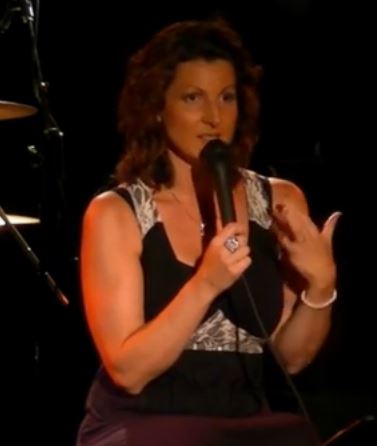
“Adam Zelkind, a dear friend of mine and a mentor to me once said ‘Kate, if you can make a penny in music, take it. If you can make a penny it will become a dime. Eventually all those dimes will add up to a million dollars.’ I don’t know if you know who Adam is, but he’s a millionaire just from making TV music.”
Adam was Kate’s mentor early on in her career of making music for TV and film and was pivotal in her advancement in this field. Eventually, Kate would team up with another Adam, Adam Stengal along with another music industry veteran, Howard Rosen to form her placement company “Song Placement International”. Together, this trio has created a formidable force in this elusive field.
Regarding some basics about song placement Kate had a few words of wisdom to offer:
- If you get in contact with a music supervisor directly, that email is gold, don’t ever lose it.
- When you e-mail them, ask them “how do you want the music?” (Most want a link).
- Unless they are willing to pay over 25K for the initial sync fee it is not worth doing an exclusive deal. Most syncs are non-exclusive.
- Steer clear of “re-titling”. Re-titling is when a song placement company changes the title of a song so they can own the publishing and masters.
- If you’re song is vocal-based, always send the instrumental track as well.
- Re-makes of known cover songs work great for T.V., just make sure you have the permission to do the re-make.
Advertising provides the most lucrative opportunities for song placement, for example, a car commercial might pay $25,000 upfront. Next in line would be TV, with major network nighttime show placements starting in the $4-$5000 range for indie artists.
Regarding genres – “They want everything…hip-hop, singer-songwriter, orchestral, driving beat…the more variety you have, the better chance you have of getting placements.”
She also added that lyrical content doesn’t matter so much when it comes to TV music…“it’s all about the dialogue over the top of the music”.
Kate expanded on many of these points at length and by the end of her talk it became clear that music placements in TV, film and video games are a largely unexplored area for many songwriters and artists. As most songwriters are striving for cuts with major artists or trying to achieve their own success as artists, many don’t realize that this angle can be a means to an end while they’re working towards other goals. And, perhaps even more importantly, making music for tv and film can be a more easily obtainable goal.
If you think your music is worthy of being placed in tv or film, Kate would be more than happy to hear from you. You can contact her at kate@songplacementinternational.com – please send links only, no song attachments.
https://www.youtube.com/watch?v=2eWaE_gZkyE&list=PL8RXighnAxWIT_c0-P-LO28gV7GkP9rVh
Kate Taylor performing her original song “homecoming Queen”
https://www.youtube.com/watch?v=ODa0hzb5IOg&list=PL8RXighnAxWJ4DZcKjF3KPXa-HZMYekkK
By Eric Normand
Sunny days, dusty hayfields, huge crowds, great music, great people, light beer, diesel fumes, gator balls – these were the sights, sounds and aromas of the 2014 Luke Bryan Farm Tour. I can’t believe it’s over, it seems like I just hopped on the bus yesterday. The 8 shows spanning two weeks whirled across the Deep South with the speed of a jet plane and the intensity of a freight train.
My role in this mega-tour as lead guitarist and bandleader for Nashville’s most successful songwriting team of all time, The Peach Pickers, began with our pre-tour warm-up show at a sold out Third and Linsley in downtown Nashville on September 26. The show, which benefited The Wounded Warrior Project was a huge success, and a couple of days after this electric night we hopped aboard a bus bound for Knoxville, TN.
Even though it was October 1, it still felt like summer when I hopped off the bus around 8 AM, the temperature already approaching 80°. This day began for me like every day that would follow on this tour, a trip to catering! After some eggs, home fries and coffee I got ready for my daily trip to the gym with members of Luke’s band and one of the other opening bands, Cole Swindell. While I was doing my thing at the gym, other members of our entourage walked the hayfields, while others took advantage of another luxury provided to the touring musician, sleeping late.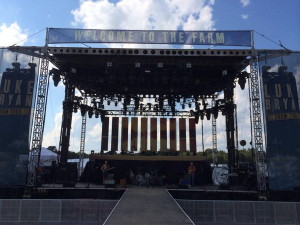
By mid-afternoon it was time for our load-in and sound check. The level of production on this tour was top notch, sporting state-of-the-art lighting, some really cool video walls, and a PA system that would rival that of any mega-rock tour. They even had a remote-controlled flying camera that captured video footage of the audience and performances, otherwise referred to as “the drone”.
Luke’s crew, along with the other crews (which included the world-class sound company, Claire Brothers) not only knew how to make us sound and look great, they were a pleasure to work with. After sound check it was time for a little rest, a quick shower and some dinner before taking the stage at 6:40 PM. Our 40 minute set began just a few minutes after the tour’s first opener, Louisiana native and singer-songwriter, Chancie Neal. The sun was just beginning to set as the DJ introduced our show with something like:
“These three guys are the most successful songwriting team in the history of Nashville. They have 60 number one hits…230 million downloads… please welcome to the stage – Rhett Akins, Ben Hayslip, Dallas Davidson…The Peach Pickers!”
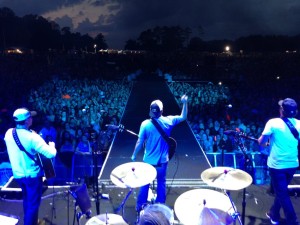 The crowd went wild and we began our onslaught of 13 number one songs with “The Only Way I Know”, a Peach Pickers cut by Jason Aldean. In rapid-fire succession we played down our list, each song greeted with, and followed by the sound of 15,000 people going absolutely berserk! After a few rockers we slowed things down with the heartfelt ballad “I Don’t Dance”. A few of the songs towards the end of our set really seemed to hit home with themes that everybody in this crowd could relate to – “Small Town Throwdown”, “Parking Lot Party”, “All about Tonight”, and the epic hip-shaker, “Boys Round Here”. The set went by like a blur, seeming to end as quickly as it began, and the three stars of our show left the stage to a deafening applause. The crew and stagehands helped us tear down and pack up our gear with lightning speed, and by quarter of eight it was all loaded on the bus and we were done working for the night. Only six more hours until bedtime!
The crowd went wild and we began our onslaught of 13 number one songs with “The Only Way I Know”, a Peach Pickers cut by Jason Aldean. In rapid-fire succession we played down our list, each song greeted with, and followed by the sound of 15,000 people going absolutely berserk! After a few rockers we slowed things down with the heartfelt ballad “I Don’t Dance”. A few of the songs towards the end of our set really seemed to hit home with themes that everybody in this crowd could relate to – “Small Town Throwdown”, “Parking Lot Party”, “All about Tonight”, and the epic hip-shaker, “Boys Round Here”. The set went by like a blur, seeming to end as quickly as it began, and the three stars of our show left the stage to a deafening applause. The crew and stagehands helped us tear down and pack up our gear with lightning speed, and by quarter of eight it was all loaded on the bus and we were done working for the night. Only six more hours until bedtime!
Our show was followed by the fast rising, Cole Swindell, another Georgia native currently enjoying his second number one song, and his four-piece band kept the party going full force. By 9 PM it was time for the Tour-D-Force of this event, Luke and gang to take the stage, his show beginning with the modern day phenomenon of thousands of cell phones being raised into the air to capture an endless barrage of digital photos.
Luke’s show is an exciting ball of kinetic energy, his top notch band providing an AC/DC like “foot stompability” that kept the audience pulsating for his 90 minute set. The phrase “sing along” doesn’t even begin to paint the sonic picture of the sound of 15,000 people singing at the top of their lungs at a Luke Bryan concert. After Luke’s show ended, the crowd quickly dispersed the field, only to be trapped in a massive traffic jam as thousands of cars began their slow motion journeys down the one lane road that led out of this little piece of rural America.
This first day and night of the tour was a huge success, and with each following show, the tour seemed to gain momentum. The only snag of this first week was some torrential rain during Friday afternoon in Tallahassee Florida, and despite what seemed like an impending disaster, the rain subsided right before showtime and the night went off without a hitch. The following night we ended the first leg of 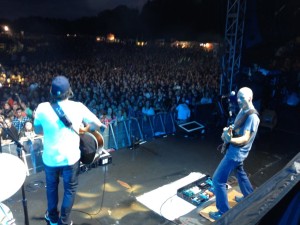 this tour to a crowd of 17,000 in Gainesville Florida, and this was, in my opinion, The Peach Pickers strongest performance yet.
this tour to a crowd of 17,000 in Gainesville Florida, and this was, in my opinion, The Peach Pickers strongest performance yet.
A few days off and we were back at it for round two. The week started out smoothly, but late Thursday afternoon in Columbia, South Carolina it began to sprinkle, with the sounds of thunder and the view of lightning in the distance. Oh no, it was happening again! We pushed back the start of the performances by 20 minutes, and midway through Chancie’s set a downpour began. With a handheld wireless microphone, this brave girl stood out in the pouring rain on the middle of the runway and kept everybody’s spirits high. By the end of her show she was soaked head to toe, as was her acoustic guitar player and percussionist, Austin Marshall (who also just happens to be the Peach Pickers tour manager). The rain stopped as she exited the stage, which was now soaked, and a dozen stagehands began to dry the stage using push brooms, towels, and high-powered electric fans. We began our show with a strange hue lurking behind us in the form of some ominous storm clouds and lightning in the distance.
By the second to last show in Columbia, South Carolina our band was really beginning to hit its stride, and by the final night of the tour, Saturday in Macon Georgia, we were on fire. On the bus shortly before our set, we all talked about our agenda for the night, which basically consisted of kicking some serious ass. And that’s exactly what we did! At one point of the show, me and Dallas even did a couple of moves that might have almost seemed choreographed. The show ended with our usual closer “Boys Round Here” during which Dallas, Rhett, and Ben walked the runway with their wireless microphones, slapping hands with the audience in a climactic sing along.
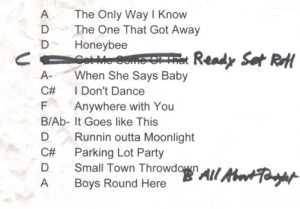 There’s a really unique aspect to a Peach Pickers show. We play songs that are the most successful chart-toppers of modern-day country radio, songs written by these three guys, yet made famous by others. So the crowd knows our tunes, yet most have never heard them performed by the original writers. A Peach Pickers performance is very organic, powerful, sometimes rough around the edges, and performed by what many in Nashville would consider a “stripped down band”. Most of the radio versions of our songs feature multi-tracked guitars, layers of fiddle, steel, keyboards, background vocals, etc, and most touring bands that play behind country artists consist of this instrumentation. Our group is basically like a traditional rock band – drums, bass, and two electric guitars. Nothing against modern day radio production, but I find that this stripped down approach allows us to rock a little harder while allowing the essence of the song to shine through without obstruction.
There’s a really unique aspect to a Peach Pickers show. We play songs that are the most successful chart-toppers of modern-day country radio, songs written by these three guys, yet made famous by others. So the crowd knows our tunes, yet most have never heard them performed by the original writers. A Peach Pickers performance is very organic, powerful, sometimes rough around the edges, and performed by what many in Nashville would consider a “stripped down band”. Most of the radio versions of our songs feature multi-tracked guitars, layers of fiddle, steel, keyboards, background vocals, etc, and most touring bands that play behind country artists consist of this instrumentation. Our group is basically like a traditional rock band – drums, bass, and two electric guitars. Nothing against modern day radio production, but I find that this stripped down approach allows us to rock a little harder while allowing the essence of the song to shine through without obstruction.
While Rhett has had success and experience on the big stage, Ben and Dallas are newer to this forum, yet they rise to the occasion every time, perhaps with an excitement and enthusiasm that would be impossible to have in any other scenario. Together, the three of them make a formidable team. It probably doesn’t hurt that the rest of our band is made up of some extremely talented folks – Nick Forchione on drums and former G-men, Mike Chapman on bass and Chris Leuzinger on electric guitar. I’m extremely proud of this band, were all friends, we love playing music together, and we make it happen every time.
The farm tour might be over, but the memories are forever. Luke’s entire crew, band, and management treated us with great care and respect, which speaks volumes of the man himself. We all made some new friends and strengthened the bonds between old ones, and I sure hope we get to do it again next year! In the meantime, The Peach Pickers might just have a few more surprises for you, stay tuned!
Click to view a slideshow of many more images from the shows.
By Eric Normand
I recently read an article on Huffington Post, “Art and Music Are Professions Worth Fighting for, and while I agree with some points of this article I think the author does a major disservice in presenting the pursuit of music as a profession in a kind of “all or nothing” approach. He talks about a presentation he made at a high school career day where he suggests music as a possible career choice for young people. He says that those interested should “go for it, with abandon and furious joy, and that you do so without a plan B”. This is where I disagree. I also disagree with the distinction this makes between “career musicians” and nonprofessional musicians. Just because you don’t play professionally doesn’t mean your music isn’t valid. I agree, if you love music and want to pursue it, why not pursue it wholeheartedly, but what’s the matter with pursuing music while earning a living from something else? What’s the matter with pursuing music for the mere enjoyment of it? I believe you can pursue music as a career and for fun, but you need to keep your eyes open and realize that you will need a steady income stream along the way. To decide how music or a music career might fit into your life, perhaps the questions you really need to ask yourself are; why are you pursuing music, what do you want to get out of it, and what will it take to be successful? What is your definition of success?
When I was a senior in high school, if you had asked me what I wanted to be when I grew up I would have said, “a professional musician”. Immediately after high school I got a job as an apprentice drywall carpenter before enrolling in the Berklee College of Music two years later. After Berklee I played professionally in nightclub bands for the next 14 years, eventually also becoming a guitar teacher. In 2002 I relocated to Nashville Tennessee where I’ve had the good fortune to work as a hired gun on several major tours. My first gig was as a guitar tech for Toby Keith, and I went on to play lead guitar with several country artists – Daryle Singletary, Vern Gosdin, Rhett Akins, and the hit songwriting team known as “The Peach Pickers”, among others. I also wrote a book about how to navigate the Nashville music industry, “The Nashville Musician’s Survival Guide”.
Looking back, if you had told that starry-eyed high school kid that one day he would be a musician, painter, drywall carpenter, teacher, author, and website designer, he would’ve said “Naw, I’m not interested in any of that other stuff”. But as they say “life is what happens while you’re busy making other plans”, and one of the things I’ve learned along the way is that you have to wear a lot of hats to survive in this world. The truth is, my original goal of being a professional musician was based on the glamorization of the musical era that I fell in love with, and I had no idea about the reality of any of it.
What do professional musicians do?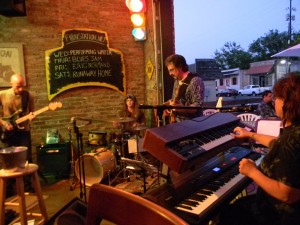
We starve! Just kidding (well, not entirely). The options for musicians trying to earn a living from their craft are somewhat limited. The way I see it you can pursue one or more of the following avenues; nightclub musician, music teacher, touring musician, or session musician. Sure, there are other gigs (orchestra musicians, jingle writing, etc.) but these four are the most practical, and out of these, the first two are the only ones that ever become reality for most. If you want to be a touring or session musician, you will need to live in a music metropolis such as Nashville, New York, or LA, and these are extremely hard (but not impossible) gigs to land.
Regarding paying gigs, I’m talking about work you can get on a regular basis that pays real money for your services. Therefore, I’m leaving out songwriters and aspiring artists because these do not pay any real money unless you become extremely successful. TV shows like “American Idol” and “The Voice” have propelled the myth that anybody that learns how to sing a good cover song can become a national recording artist and superstar. Out of the tens of thousands who audition for these shows and the hundreds that perform on them annually, how many are ever heard from again?
While I cherish many of my experiences as a professional musician, I’ve learned the hard way that it doesn’t always pay the bills. Night club gigs still pay what they paid 25 years ago when I first got into this ($100 a night is still considered good pay) and most club gigs in Nashville don’t even pay that. As far as touring musicians, most tours only pay during the part of the year that the tour is active and, unless you are on a very high profile tour, you’ll have to find another income stream during the winter.
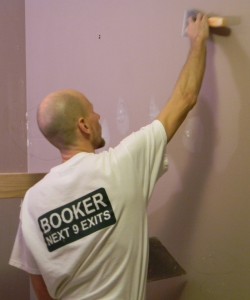 Two years ago, I went back to full-time construction work, and put my music career on part-time status. I began approaching music as simply one component of my life, and for first time since I’ve been in Nashville I’m actually earning a steady living year-round. I still play music, sometimes for pay, always for fun, and I get just as much reward, if not more, out of a local club gig playing for tips as I do when I perform with The Peach Pickers on the Luke Bryan farm tour in front of 15,000 people.
Two years ago, I went back to full-time construction work, and put my music career on part-time status. I began approaching music as simply one component of my life, and for first time since I’ve been in Nashville I’m actually earning a steady living year-round. I still play music, sometimes for pay, always for fun, and I get just as much reward, if not more, out of a local club gig playing for tips as I do when I perform with The Peach Pickers on the Luke Bryan farm tour in front of 15,000 people.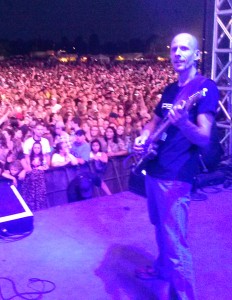
Don’t get me wrong, I’m not here to talk people out of their dreams; after all, I did write a book about surviving the Nashville music industry. But if this is your dream, you need to arm yourself with knowledge and know what you’re up against. If you’re thinking about pursuing music or arts as a profession you must first “define your success”. What is your definition of success in music? Then ask yourself why you want to do this. If it’s because you think it’s an easy and fun way to make a living you might want to do a little more research. It can be fun, but it’s definitely not easy. If it’s because you absolutely can’t see yourself doing anything else, then go for it, but have a plan B, and have a way of earning a living while you pursue it.
There’s nothing wrong with pursuing music as a career, and there’s also nothing wrong with being a musician or artist that never becomes “professional”. Music is one of the oldest forms of communication, music has the power to heal and unite people, and playing music makes you smarter. So go ahead and work at becoming a great musician, it’s a noble thing to do and the world always needs good music and art. Approach your music with abandon and joy, but don’t be afraid to have a plan B.
Follow Eric on Twitter and his blog at survivenashville.com
Today I want to tell you all about an exciting monthly event I have been hosting – The Nashville Berklee Jam, and its new accessibility to everyone in the Nashville music community. The beginnings of this idea came to me a few years ago when I first attended the annual Nashville Berklee Alumni Reception. On my way home that night, I remember thinking how great it was to meet so many musicians in one night who were so passionate about their musical ambitions and so hungry for knowledge. These musical comrades were a mix of Berklee alumni residing in middle Tennessee and Berklee students who came down for the annual Nashville field trip. At this reception I made connections with other like-minded alums and students who came down on the field trip, the latter peppering me with questions about my experiences in Music City. This event was a very stimulating night as the energy of three hundred musical minds meeting and conversing seemed to create an air of camaraderie and untapped potential! Then I went home and another year passed before I got this fix again.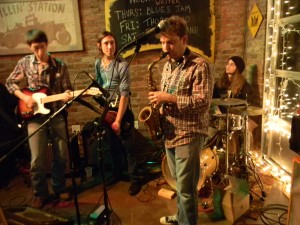
So this past winter I decided to create a monthly event to try to emulate this musical networking hoedown on a smaller scale, and The Nashville Berklee Jam was born. Held on the first or second Tuesday of the month from 7 PM to 11 PM at The Fillin’ Station in Kingston Springs, TN, these events start out with an informal meet and greet, followed by a Nashville music industry guest speaker, and end with an open jam. So far the reception has been very positive, here’s a recap (with links to their corresponding blogs):
February – A-list session bassist, Mike Chapman gave a great talk about being a session musician, outlining key concepts in what he calls, “the essential slices of the session player pizza”. He also jammed with several alums after the talk.
March – award-winning vocal coach, producer, and hit songwriter, Judy Rodman gave an insightful talk about career paths for vocalists. She also performed a couple of songs with the house band and then critiqued and coached several vocal performances, helping vocalists make instant improvements.
April – Stevie Ray Vaughan keyboardist, Reese Wynans shared his fascinating story about being a lifelong-career musician, the life-changing moment that came on his last night with Delbert McClinton that landed him the SRV gig, and the whirlwind years that followed. After his talk, he joined us for a few inspired performances.
May – fellow alum, musician, and author of “The Nashville Number System”, Chas Williams gave an introductory class on this subject. After the class, he charted one of alum, Sarah Tollerson’s originals and performed it with Sarah and the house band with everybody reading the chart off a dry erase board.
June – drummer, producer, and clinician, Rich Redmond gave an inspiring talk on “Navigating the Nashville Music Industry” speaking candidly about his early “lean years” in Music City and different approaches to finding success here. After his talk he sat in for a few tunes and stuck around to chat with others in attendance.
For our next event, to be held on Tuesday, July 10, I will be giving a talk that continues last month’s theme – “Navigating the Nashville Music Industry – Part Two”, during which I will explore some of the concepts I write about in my book “The Nashville Musician’s Survival Guide”. And, this just in, for our event in August we are proud to announce that the guest speaker/performer will be none other than Nashville guitar ace, Jack Pearson, formerly of the Allman Brothers, Vince Gill and many others.
All of the guest speakers have given great talks, sharing their knowledge and providing inspiration, and these talks have been interactive with many great questions and comments from alums. My band, Skinny Buddha (comprised of Berklee alumni and others from the Nashville music community) provides backline and a starting point for the laid back jams which have covered everything from originals to classic rock to blues tunes to two-chord jams. All of these events have been great friendship building and networking experiences for all involved, as well as educational. So far, the attendance has been mostly comprised of Berklee alumni, but as there seems to be a growing interest from others in Nashville, we are now officially making this event open to the Public. Nashville is a diverse and complex music community in which a Berklee alumni community also resides, and it is my goal to help these two worlds intersect and meld together.
So come on out to our next “Nashville Berklee Jam” On Tuesday, July 10. I hope to see you there!
P.S. if you have any comments, thoughts, or questions, please feel free to e-mail me at eric@ericnormand.com.
Some of my earliest childhood memories are of my dad playing records and, dare I say, reel to reel tapes of the music of Paul Butterfield, John Lee Hooker, Santana, and Derek and the Dominoes. I guess this music made an impression, because by my early teens in the early 1980’s I was buying my own records, not of the pop-based FM radio music of my generation, but of the previous generations more blues-based artists. While everyone else was listening to E.L.O. and Michael Jackson, I was discovering Jimi Hendrix, the Allman Brothers, BB King and Bobby Bland. Sure, I liked some of the 80’s guitar rock of the day, but always kept digging back to a more rootsy sound. Then right smack in the middle of 80’s hair band mania came Stevie Ray Vaughan, and I immediately related to his music.
Stevie’s music influenced a generation of guitarists and, at a moment where rock and pop music was winding itself up, almost single-handedly brought blues music back into the light. You couldn’t go see a club band during the late 80’s and early 90’s without hearing his music. I found myself covering his renditions of blues classics like “The Sky Is Cryin’”, “Empty Arms”, as well as originals like “Cold Shot” and “Walkin’ the Tightrope”, as did many others at that time. Stevie’s instrumental “Riviera Paradise” from the album ‘In Step’ is a beautiful piece of American roots music, and I always loved the spooky vibe created by his magical band on that song in particular.
I’ll never forget the day I heard of his tragic passing, how sad it was that we had to lose such a wonderful artist at such a young age. But his music, and the influence of his music, lives on, and I, like many others, will always appreciate everything Stevie did for music, and everything his music has done for the world.
So that’s why when I began hosting the Nashville Berklee Jam I felt compelled to 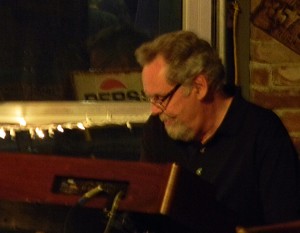 have Reese Wynans, the keyboardist who played with Stevie for the last five years of the great guitarist’s life, as a special guest speaker/performer. Reese was kind enough to share his story with me and a room full of alums at our monthly Nashville Berklee Jam last Tuesday at The Fillin’ Station.
have Reese Wynans, the keyboardist who played with Stevie for the last five years of the great guitarist’s life, as a special guest speaker/performer. Reese was kind enough to share his story with me and a room full of alums at our monthly Nashville Berklee Jam last Tuesday at The Fillin’ Station.
Almost 20 years before he began working with SRV he was playing in cover bands in his home state of Florida, and he recounted one of his first bands playing five sets a night, six nights a week. Two of the other members were Dickey Betts and Berry Oakley and on their one day off they would play a weekly free jam, adding Duane Allman and Butch Trucks to the mix. Eventually Duane decided to start his own band and stole these key members to form The Allman Brothers.
After spending a few years in San Francisco and working with a still-unknown artist at this time, Boz Scaggs, he returned to Florida for a brief period and then worked the East Coast in a show band for a few years. Reese then migrated to Austin, Texas, a booming town full of blues-infused music by this point of the mid-70s. Of this time, Reese spoke passionately.
“It was really great for me living in Austin…everything was so rootsy…they had a great music scene back there in the 70’s. They had a great blues scene, and a great blues club called ‘Antone’s’…and I would go and sit in at Antone’s anytime I had a chance. I was ending up really lovin’ the blues during this time.”
By 1980 he found himself working for Delbert McClinton, playing on four of his records and touring extensively for the next five years. By 1985, Reese was ready to get off the road, and would have if not for a fateful encounter at the end of his final gig with Delbert. Apparently, Delbert’s sax player had been invited to play on one song of a Stevie Ray Vaughan recording session after Delbert’s concert, and at the last minute Reese was asked to join in as the other keyboardist did not show up. Things went very well at this particular recording session, one which produced the hit, “Look at Little Sister” and Reese was asked to come back and record the following day. By the end of that recording session he was asked if he wanted to join the band. Reese summed up a life lesson from this critical moment,
“When a door opens for you, you’ve got to be willing to walk through it, and then be able to deliver once you get through there.”
The next five years would yield three Grammys, several world tours, and a reintroduction of the blues to the masses –
“We were spokesman for Texas blues…as much as Stevie didn’t want to, BB King had to open for us, because we were just more popular than him. He said “no we can never, BB’s always closing the show”… but finally, we had to headline…I loved playing in that band…we were all totally immersed in the blues, and we felt like were the vanguard of the blues. We were dragging Buddy Guy and Otis Rush into the light and presenting them out on our shows to people who were just hungry for that music…the stuff that we played I thought was shining a light on all the huge blues guitar players that had come before us, and that was a wonderful thing to do, I felt like it was really worthwhile.”
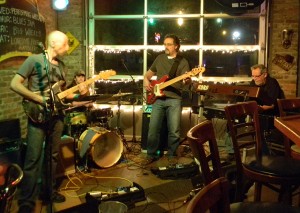 After Stevie’s tragic passing, Reese wound up in Nashville, TN, a place where he has continued to record and perform on a national level. During the talk, Reese passed around his All Music Discography, which reveals a staggering body of work, including Brooks and Dunn’s 2006 single of the year “Believe”. He offered us some thoughts about the differences between studio and live performance –
After Stevie’s tragic passing, Reese wound up in Nashville, TN, a place where he has continued to record and perform on a national level. During the talk, Reese passed around his All Music Discography, which reveals a staggering body of work, including Brooks and Dunn’s 2006 single of the year “Believe”. He offered us some thoughts about the differences between studio and live performance –
“I like being in the studio, I like playing gigs, I like playing clubs…all you people who do studio work know it’s two different things. Playing a club is really a chance to experiment…a chance to reach out in different directions and really find yourself. The studio isn’t really a place for that. The studio is where you don’t have to play it safe, but you’ve got to do something that’s exactly right for the 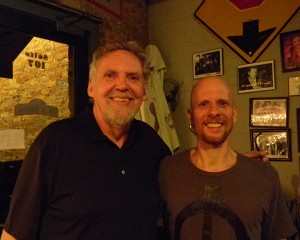 song…it’s a place for finding something that works, finding something unique that works.”
song…it’s a place for finding something that works, finding something unique that works.”
After his talk was finished, Reese was gracious enough to perform a set with our house band – a performance that was nothing short of inspired. I’ve heard his playing on many records, but there’s something intangible that you can feel in the heat of live performance that goes beyond a recording, and that was evident on this night. One of the songs we played together was “Little Wing”, a song that he had played on tour with Stevie, back in the day. On this song, Reese seemed to really stretch out in one of those magical musical moments in which time seems to stand still (see video below).
Eventually, this special night had to end, and we said goodbye after a quick photo op. Thanks, Reese, for sharing your wisdom, and for continuing to shine some light on that crown jewel of American music we call the blues.
Our second “Nashville Berklee Jam” at The Fillin’ Station in Kingston Springs this past Tuesday was a great success! The guest speaker on this night was none other than Nashville’s award-winning vocal coach, Judy Rodman. Judy has played many a role in the Nashville music industry 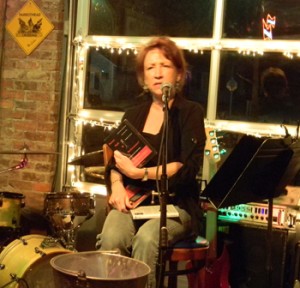 over the years – recording artist, A-list session singer, producer, hit songwriter – and on this night her talk focused on different career paths for vocalists. Judy was involved in the writing of my book “The Nashville Musician’s Survival Guide” and, backing up my theory of the necessity to “wear a lot of hats”, she talked about multiple streams of income for today’s musicians and artists. Among the potential jobs for vocalists she outlined were artists, live singers, and session singers (jingle singers, background vocals, demo singing, and voiceovers).
over the years – recording artist, A-list session singer, producer, hit songwriter – and on this night her talk focused on different career paths for vocalists. Judy was involved in the writing of my book “The Nashville Musician’s Survival Guide” and, backing up my theory of the necessity to “wear a lot of hats”, she talked about multiple streams of income for today’s musicians and artists. Among the potential jobs for vocalists she outlined were artists, live singers, and session singers (jingle singers, background vocals, demo singing, and voiceovers).
Here are a few excerpts:
“Recording artists need vocal ability, because the mark is up. Even with pitch fixing, rhythm fixing…your vocal needs to be as good as it possibly can be because it’s going to sound more natural and it’s going to be more emotionally compelling…You also need a ‘unique artist definition’…it’s not good enough to be just another great singer…you really need to be unique and find your own definition as an artist – your uniqueness, your vocal uniqueness – which means you need to explore your whole voice and your life experiences that you’re going to put into your art. The sound of your artistic definition is going to have to do with the sound of your voice, the choice of your instrumentation, and your message… Artistic definition takes exploration. For those of you wanting a career as a recording artist I would say don’t shortcut your experimentation.”
“For live background singing – you need to have the ability to trace and completely blend and go with the nuances of the voice of the singer you are looking to back…You’ve got to be able to change your sound as the artist wishes…you will of course have to have the ability to sing harmony parts and hear them… you have to have a specific look – whatever the artist is looking for. You need to network and find out who is gigging, who is in need of background vocalists.”
“Session singing…You need great vocal technique, usually you’ll need some vocal training…you really need to have surgical control of your voice for pitch, sound, blend and nuances –because time is money in the studio…You need to of course hear harmony parts quickly, you need to have the ability to read manuscript…but you also need to know the Nashville Number System.”
Judy then gave some practical vocal technique tips before answering several questions from alumni. Click on the following links if you would like to hear her talk in its entirety.
Judy Rodman Talk – Part One (21 min)Judy Rodman Talk – Part 1 (21 min)
Judy Rodman Talk – Part Two (21 min) Judy Rodman Talk – Part 2 (21 min)
There is also a ton of useful and practical information for vocalists at Judy’s website www.judyrodman.com.
When her talk concluded we began the jam portion of the evening with our house band backing Judy for two songs to start things out. Her second tune, “One Way Ticket”, was a number one hit she wrote that was cut by LeAnn Rimes. Judy’s vocal performance was emotionally 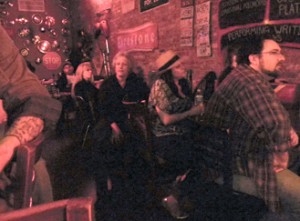 charged and inspiring to say the least, and this set the tone for the rest of the evening. A special dynamic on this night was the “optional vocal performance critique” that Judy offered for willing participants. To break the ice, I decided to go first and sang my two songs with the house band. After my first song, Judy pointed out some of the strengths about my performance and addressed a few things to work on.
charged and inspiring to say the least, and this set the tone for the rest of the evening. A special dynamic on this night was the “optional vocal performance critique” that Judy offered for willing participants. To break the ice, I decided to go first and sang my two songs with the house band. After my first song, Judy pointed out some of the strengths about my performance and addressed a few things to work on.
The jam continued with several great performances. Brian Lucas, the house keyboardist, sang a great rendition of “Georgia”, for which he took the vocal critique option. This pattern continued for the rest of the night, with literally every vocalist asking for a critique. Among these were Ted Schempp, the vocal duet “Acklen Park” (performing songs they co-wrote with alum, Shantell Ogden), Sarah Tollerson, and Michelle Lambert – all performing original 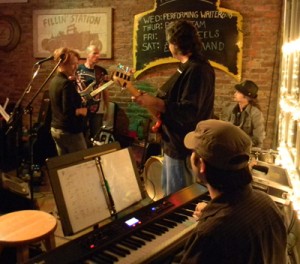 material. After the first song by each performer, Judy offered critiques and then we would try a part of the song again, seeing instant improvement in the vocals (don’t get me wrong, the vocal performances were pretty strong to begin with). Alums, Elton Charles on drums and Rick Carizales on guitar, also sat in and did a fine job backing up some of the guests. Brian Lucas made a big contribution by charting out many of the songs in advance, and Shantell helped out by taking photos and some great video excerpts (see below).
material. After the first song by each performer, Judy offered critiques and then we would try a part of the song again, seeing instant improvement in the vocals (don’t get me wrong, the vocal performances were pretty strong to begin with). Alums, Elton Charles on drums and Rick Carizales on guitar, also sat in and did a fine job backing up some of the guests. Brian Lucas made a big contribution by charting out many of the songs in advance, and Shantell helped out by taking photos and some great video excerpts (see below).
It really was a special evening, fun was had by all and I think everybody learned a few things too. I want to thank Judy Rodman, our house band (Heston Alley on drums, Tom Good on bass, Brian Lucas on keys) and all the alums who participated and helped make this a special evening, I can’t wait for the next one!
The next Nashville Berklee Jam will be held on Tuesday, April 10th at the Fillin’ Station with special guest, Reese Wynans, formerly of Stevie Ray Vaughn & Double Trouble. His talk will share perspective on being a lifelong career musician, working with SRV, and the importance of understanding blues and roots music. Please check our website regularly for updates.
That’s right everybody, the book really is finally done and now available to all who have been patiently awaiting its arrival. Orders for the print version will be processed and shipped this week, the e-book and Kindle version will be ready and available by the middle of next week, and I can’t tell you how excited I am to finally be at this point in time! Others involved in the project are getting excited too. Check out these back cover blurbs that a couple of folks offered after checking out advance copies:
“Awesome! Required reading for any musician moving to Nashville, especially as a hired gun.
Hundreds of hours of priceless advice condensed into one thorough and brilliant book
– an incredibly helpful masterpiece. Makes me want to move there now!”
— DEREK SIVERS, Founder of CD Baby
And:
“If you are making or want to make money in the music industry of Nashville, “The Nashville Musician’s Survival Guide” should be your next purchase. Eric Normand’s beautiful and comprehensive book contains invaluable insider information and practical advice from pros actually making a living in the industry now. A terrific read for anyone interested in peeking into the unique world of music Nashville. Even the pictures rock!”
— JUDY RODMAN, Vocal Coach, Producer, Hit Songwriter
As you could imagine, there was a big celebration at the Normand house when these e-mails arrived!
When I embarked on this journey two years ago last January, I had no idea I would be entering the world of book self publishing. In fact, when I initially began writing the content that became the foundation of this book, I had no intention of writing a book at all, or even the knowledge about how to go about doing this. At that point in time, I was simply trying to help a few folks on Craigslist and other message boards who wanted some info about the Nashville music biz’. The next thing I knew I was writing a book, almost by accident. The more I wrote, the more I began to understand the massive scope of this project, and the work it would entail to finish it – Internet research, extensive recorded interviews, photo taking excursions, etc. At some point along the way the book began writing itself. It was as if I was a mere conduit, the end result first being the story of the modern-day Nashville music industry magically appearing on my computer screen, and now in this wonderment of a book.
I couldn’t have done it alone either. Dozens and dozens of people have contributed their time and resources to this project and for this I am eternally thankful, their contributions have made this a far greater book than I could have produced alone. While the entirety of this project has been a massive undertaking (there were many times that I felt as if I would be writing this book for the rest of my life), this has truly been a labor of love – my way of paying forward all that I have learned in this strange place we call Music City, and I am absolutely thrilled with the end result.
So if you’ve been waiting for this book, it really is finally here. Thanks for your patience and I hope you enjoy reading “The Nashville Musicians Survival Guide!”
P.S. If you live in middle Tennessee, I would like to invite you to our official book release party at The Fillin’ Station in Kingston Springs on Saturday, April 30 from 7 to 11. Many of the contributors to the project will be in attendance on this night, there will be music performed by my band (Mike Chapman will be on bass and Fran Breen on drums), and the first three people to ask will receive a free copy of the book.
As I’m now nearing the end of this book writing project, I’m realizing that I have neglected the Survival Guide site a bit. While I have managed to put up a new blog at least once a week for the past year, it’s been quite some time since I’ve added any new content anywhere else on the site. I’ve wanted to make some changes for a while, and this week, along with the help of the world’s greatest webmaster, Kelly Normand of Just Ducky Designs, we added several new useful features, or “Extras” to the site.
In a recent conversation with a talented singer songwriter from Maine considering moving to Nashville, he inquired about what clubs would be worth checking out. I told him that The Bluebird, The Commodore Grill, and Douglas Corner all hosted popular weekly writers’ nights, and it would serve him well to check these out when he comes down. (BTW -the singer/songwriter’s name is Chris Ross and he’s a great talent, definitely worth checking out! Here’s a link to one of his inspired Youtube performances). But the conversation gave me another idea. My site, that refers to itself as “a central point of information geared towards helping musicians, singers, songwriters, engineers, and others find their way in the Nashville music industry.” was missing something. After a fair amount of digging and e-mailing, I have put together a thorough listing of some of the the most popular writers night’s, blues jams, and open mics in middle Tennessee. More will be added later, but this is certainly enough to get you started. If you host one of these types of events and would like it posted here, just send me an e-mail.
I also created another new section of the site I’ve wanted to develop for quite a while now, “Road Manager Resources”. This will be all practical stuff for tour managing on any level. Right now, if you go to that page, I’m offering a free download of my itinerary template. This is an ideal starting point for you to build your own custom day sheets for your tour or band. Have you ever been on a tour that seemed void of all pertinent information? I have. I’ve been on tours where the tour manager didn’t provide itineraries and didn’t have many answers to the most basic questions. Every day would come and go with most of the tour members asking him questions all day long. Questions like “what time is sound check?”, “what time is dinner?”, “when are we going to the hotel?”, and “what time will we be getting back?” A good itinerary, placed strategically in the front lounge of your bus or van, will not only provide all this info, it gives the tour manager the ultimate response to most questions he or she will be peppered with throughout their day – “Check the day sheet”!
When I get around to it, I plan on adding some more “tour manager goodies”, among them, an easy to use merch spreadsheet, links to some of my favorite “Road manager friendly” websites for booking hotels, flights, rental cars and more, and periodic updates to my “Tour Manager Tip of the Week” (check the site to learn this week’s tip).
I also added a brief excerpt from the book about the Nashville Recording Industry to the site. It’s kind of a precursor to some more extensive writings about this topic that will be explored in the book.
And lastly, I would love your feedback! If there’s something you’d like me to blog or write about, or another feature you would like to see added to the website, let me know and I’ll see what I can do.
So that’s it for now, there’s a lot in the works, and the book is just about to go to print. Check back next week for a major announcement about its release.
P.S. If you live in Middle Tennessee and are looking for something to do this Saturday night (March 5), I’ll be playing at The Fillin’ Station in Kingston Springs, TN with Mike Chapman and Fran Breen – 7 to 11, no cover, tons of fun, come on down!
